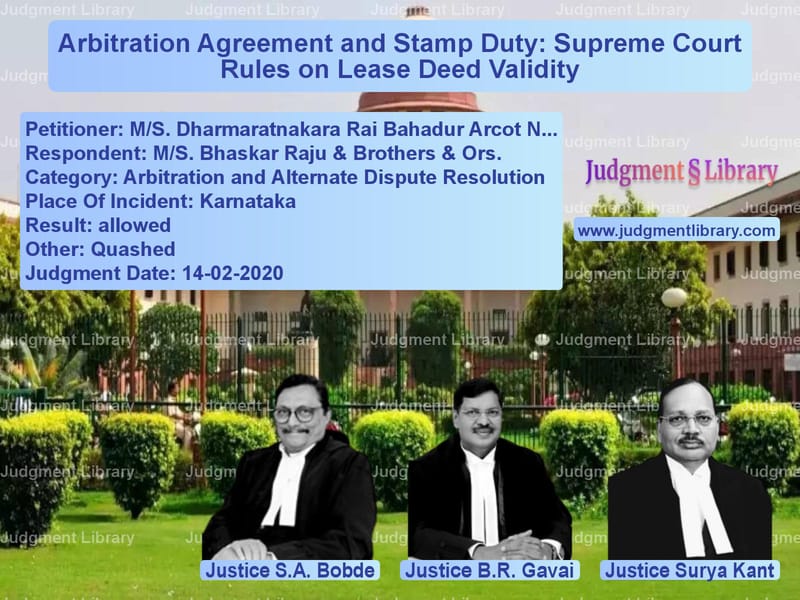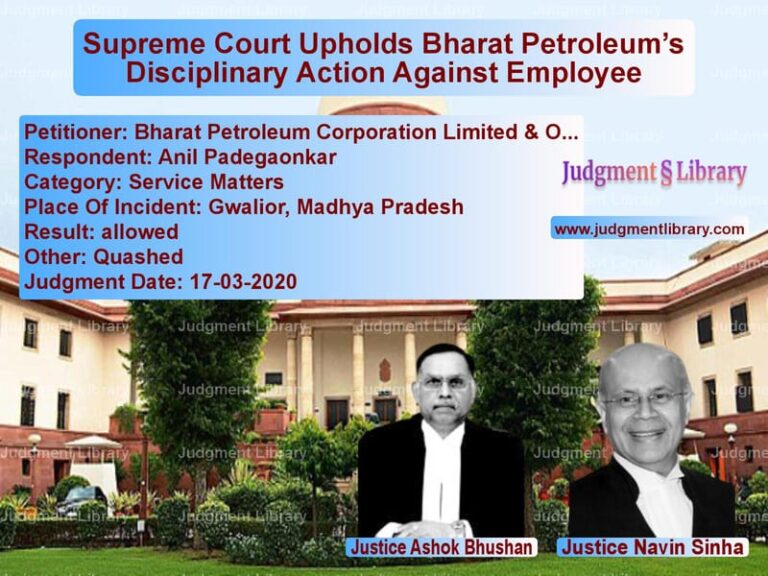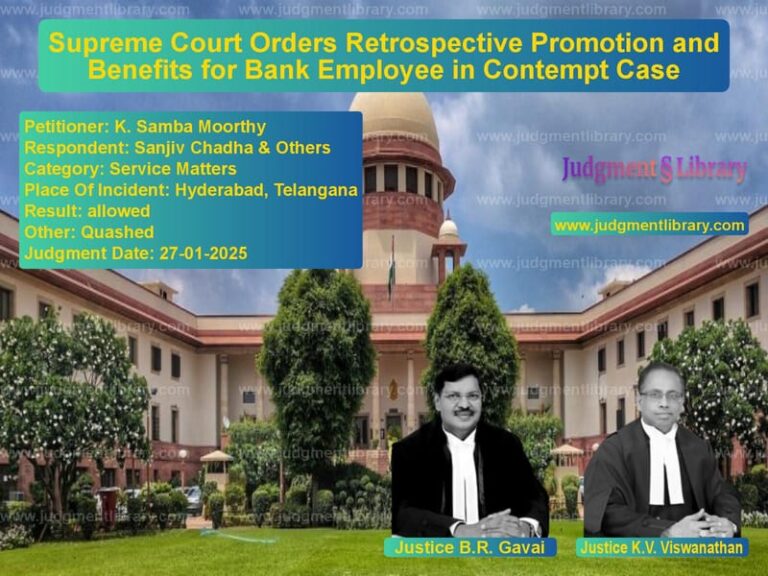Arbitration Agreement and Stamp Duty: Supreme Court Rules on Lease Deed Validity
The case of M/S. Dharmaratnakara Rai Bahadur Arcot Narainswamy Mudaliar Chattram & Other Charities & Ors. vs. M/S. Bhaskar Raju & Brothers & Ors. deals with the enforceability of an arbitration clause in a lease deed that was found to be insufficiently stamped. The Supreme Court ruled that an arbitration agreement embedded in an inadequately stamped lease deed cannot be enforced unless the requisite stamp duty is paid. This judgment clarifies the intersection of arbitration law and stamp duty regulations.
Background of the Case
The appellants, a registered charitable trust, entered into a lease agreement with the respondents in 1996 for the development of their land. The agreement was renewed in 1997 with similar terms, allowing the respondents to construct a multi-purpose community hall and office complex.
However, disputes arose between the parties over compliance with lease terms. The trust alleged that the respondents failed to pay the agreed security deposit and tried to interfere with the trust’s possession. Additionally, the trust claimed that the respondents desecrated the samadhi of the trust’s founder and attempted to execute a fresh lease agreement in collusion with one of the trustees.
The trust filed a civil suit for an injunction against the respondents, and the City Civil Court of Bangalore granted a status quo order. After participating in the suit proceedings for over two years, the respondents invoked the arbitration clause in the lease agreement and filed a petition under Section 11(6) of the Arbitration and Conciliation Act, 1996, seeking the appointment of an arbitrator. The High Court of Karnataka appointed a former judge as the arbitrator.
The appellants challenged this decision before the Supreme Court, arguing that the lease deed was not sufficiently stamped and, therefore, could not be relied upon for arbitration.
Arguments of the Petitioner (Dharmaratnakara Rai Bahadur Arcot Narainswamy Mudaliar Chattram & Ors.)
- The appellants contended that the lease deed was insufficiently stamped, making it legally unenforceable under the Karnataka Stamp Act, 1957.
- They relied on the Supreme Court’s ruling in SMS Tea Estates Pvt. Ltd. vs. Chandmari Tea Company Pvt. Ltd. (2011), which held that an arbitration clause in an unstamped document cannot be enforced unless the deficiency is remedied.
- They argued that the High Court failed to consider the Registrar (Judicial)’s report, which directed the respondents to pay a deficit stamp duty and penalty of Rs. 1,01,56,388 before the lease deed could be acted upon.
- The appellants pointed out that the respondents had not fulfilled their obligations under the lease agreement, including clearing unauthorized occupants from the leased property.
Arguments of the Respondent (M/S. Bhaskar Raju & Brothers & Ors.)
- The respondents asserted that the lease agreement was an agreement to lease rather than a completed lease deed, and therefore, did not require immediate stamping.
- They contended that the arbitration agreement was separate from the main lease contract and should be enforced independently.
- They argued that the agreement only required stamping once all tenants had been evicted and construction permissions were obtained.
- The respondents maintained that the arbitration clause should be enforced regardless of the stamp duty deficiency.
Supreme Court’s Judgment
A bench comprising Chief Justice S.A. Bobde, Justice B.R. Gavai, and Justice Surya Kant ruled in favor of the appellants, setting aside the High Court’s decision. The Supreme Court held that the arbitration clause in an insufficiently stamped lease deed could not be acted upon unless the requisite stamp duty was paid.
“When a lease deed or any other instrument is relied upon as containing the arbitration agreement, the Court is required to consider at the outset whether the document is properly stamped or not.”
The Court reaffirmed its decision in SMS Tea Estates, stating:
“If the instrument is not properly stamped, it should be impounded and dealt with as per Section 38 of the Stamp Act. The Court cannot act upon such a document or the arbitration clause therein.”
The Court also criticized the respondents for failing to comply with the Karnataka High Court Registrar’s order to pay the required stamp duty and penalty.
“Since the respondents have not complied with the directive to pay the deficit stamp duty, the High Court erred in relying on the lease deed dated 12.3.1997.”
The Court further noted that the respondents’ delay in invoking arbitration—16 years after the agreement—raised questions about their intent. It found that the respondents had actively participated in the civil suit before suddenly invoking arbitration when the case was nearing conclusion.
Key Takeaways from the Judgment
- Stamp duty must be paid before enforcement: An arbitration clause in an insufficiently stamped document cannot be enforced until the duty is paid.
- Courts must verify stamp duty compliance: The judgment mandates that courts must assess stamp duty compliance before acting on documents containing arbitration agreements.
- Arbitration cannot override statutory compliance: The ruling ensures that arbitration cannot be used to bypass legal obligations such as stamp duty requirements.
- Timeliness in invoking arbitration matters: Delays in invoking arbitration clauses, especially when litigation is already in progress, can cast doubt on the bona fides of the claimant.
Impact of the Judgment
This ruling has significant implications for arbitration agreements in property transactions. It ensures that:
- Parties cannot rely on unstamped or insufficiently stamped documents to invoke arbitration.
- Stamp duty compliance is a prerequisite for enforcing contractual clauses in legal proceedings.
- Courts must proactively assess the validity of documents before referring disputes to arbitration.
The judgment also reinforces the principle that arbitration cannot be used as a tool to bypass statutory requirements, thereby protecting public revenue and ensuring fair legal practices.
Conclusion
The Supreme Court’s decision in M/S. Dharmaratnakara Rai Bahadur Arcot Narainswamy Mudaliar Chattram & Other Charities & Ors. vs. M/S. Bhaskar Raju & Brothers & Ors. sets an important precedent in arbitration and contract law. It clarifies that an arbitration clause within an insufficiently stamped lease deed cannot be enforced until the stamp duty deficiency is rectified. This ruling strengthens compliance with the Stamp Act while ensuring that arbitration remains a legitimate dispute resolution mechanism within the bounds of statutory law.
Petitioner Name: M/S. Dharmaratnakara Rai Bahadur Arcot Narainswamy Mudaliar Chattram & Other Charities & Ors..Respondent Name: M/S. Bhaskar Raju & Brothers & Ors..Judgment By: Justice S.A. Bobde, Justice B.R. Gavai, Justice Surya Kant.Place Of Incident: Karnataka.Judgment Date: 14-02-2020.
Don’t miss out on the full details! Download the complete judgment in PDF format below and gain valuable insights instantly!
Download Judgment: MS. Dharmaratnakara vs MS. Bhaskar Raju & Supreme Court of India Judgment Dated 14-02-2020.pdf
Direct Downlaod Judgment: Direct downlaod this Judgment
See all petitions in Arbitration Act
See all petitions in Dispute Resolution Mechanisms
See all petitions in Enforcement of Awards
See all petitions in Institutional Arbitration
See all petitions in Judgment by S. A. Bobde
See all petitions in Judgment by B R Gavai
See all petitions in Judgment by Surya Kant
See all petitions in allowed
See all petitions in Quashed
See all petitions in supreme court of India judgments February 2020
See all petitions in 2020 judgments
See all posts in Arbitration and Alternate Dispute Resolution Category
See all allowed petitions in Arbitration and Alternate Dispute Resolution Category
See all Dismissed petitions in Arbitration and Alternate Dispute Resolution Category
See all partially allowed petitions in Arbitration and Alternate Dispute Resolution Category







